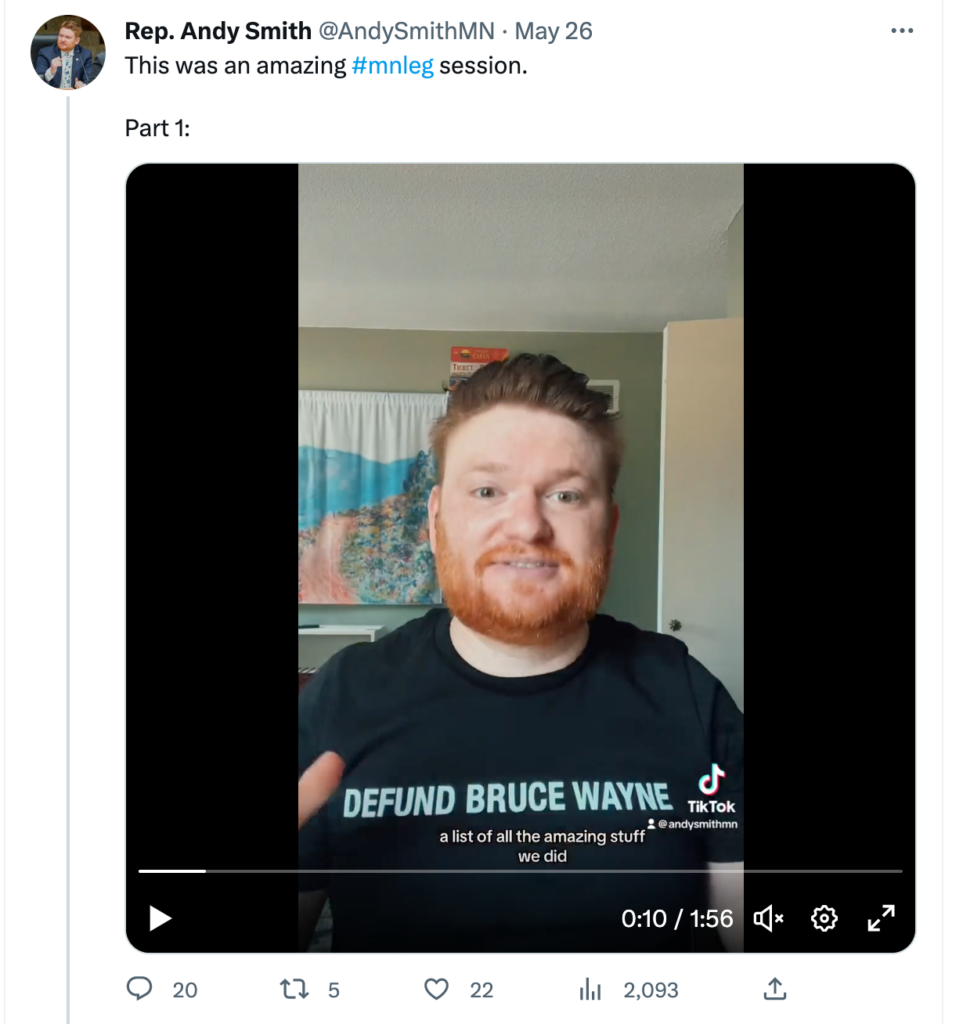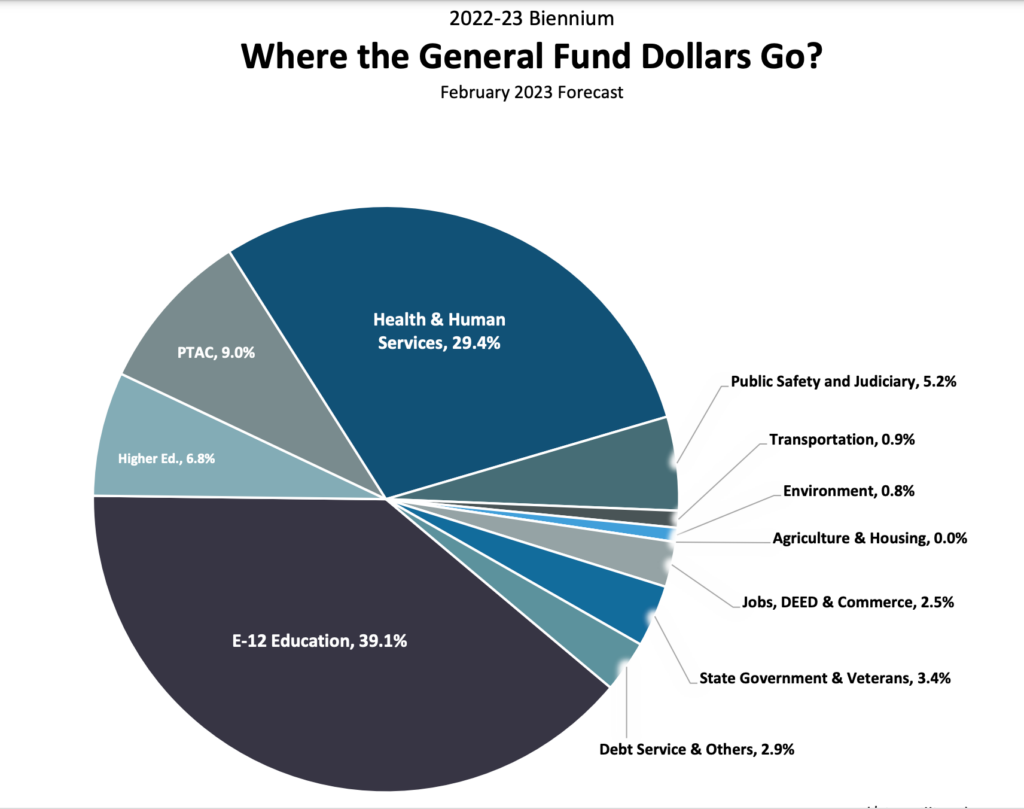Capitol Watch: Five reasons we’re going off the cliff
Beyond the big-ticket items that got most of the press attention such as abortion, transgender rights, tax rebates and gun control, the 2023 legislature made several dramatic policy changes that will fundamentally and permanently change how Minnesota works, or doesn’t work, in the future.
Each policy change sounds good on its face. For example, who could be against free school lunch? But each change also takes the state one step closer to socialism. For decades, going back to that iconic Time Magazine cover celebrating the “state that works,” Minnesota’s strong and diverse economy has enabled our steady march toward big government socialism. But the days of living on house money are over.
We like to pick on Rep. Andy Smith (DFL-Rochester) as the most unserious legislator in St. Paul, but his post-session review on Twitter is quite serious. He sounds like Oprah Winfrey giving away gifts to her studio audience at the end of a show. Except Winfrey paid for the gifts through advertising revenue, not taxation. Rep. Smith spells out all the good things that will happen with their new programs without discussing the cost.

Democrats are oblivious to the fact that the changes made during the 2023 session will put us into a tax revenue/big government death spiral that will only be overcome by rolling back some of these programs and reining in state government spending.
Growth in state government agencies
It will take weeks to unpack the details of the massive new state budget passed for the 2024-25 biennium. To summarize, they spent all the money and more. The “more” will be paid for with new tax increases. The surplus was roughly divided between one-time spending ($12 billion) and ongoing spending that will require ongoing revenue ($5 billion). The one-time money went for big ticket items like paid family leave, housing, bonding, tax rebates, free college tuition and broadband. It also padded the budgets of every state agency for the 2024-25 biennium.
The ongoing spending (paid for with new revenue from tax increases) is now baked into the base budget going forward. The 2026-27 two-year budget will be 32.7% higher than the 2022-23 budget. Since government doesn’t produce anything, most of its costs come from personnel – government jobs. We’re still working on the final number but the new budget will include thousands of new state government (union) employees. Hundreds of them will work for entirely new bureaucracies created for Paid Family Leave, Cannabis Management, and Children, Youth and Families.
As usual, spending on health and human services received the largest increase in spending. The failure to control the growth in HHS spending will come back to haunt us when revenues inevitably drop and the state finds itself in deficit.
Since K-12 Education and HHS spending account for almost 70% of the entire state budget, putting them on autopilot spending increases is unsustainable.

Education spending on auto-pilot
Every session, legislators in both parties cave to the teachers’ union and add money to the per-pupil funding formula. But this year, Democrats took it a step further by automatically tying future increases in the formula to inflation. Sort of. The formula will now increase automatically at the rate of the Consumer Price Index (CPI), but within a band not less than 2 percent or greater than 3 percent per year. So the largest expenditure in the state budget will automatically increase between 2 and 3 percent every year. This works fine when there is a $17.6 billion surplus but will cause tremendous pressure to raise taxes in future years if Minnesota is facing a budget deficit.
Also in the education budget, the state now mandates that local school districts allow their seasonal hourly employees like bus drivers and cooks to participate in the unemployment insurance program. This will raise insurance costs for every school district and take even more workers out of the labor force in the summers as hourly school workers collect unemployment instead of seeking another job.
Education will also be more expensive when local school districts realize they have to hire new staff to implement the ethnic studies mandates forced on them by the state. All curriculum in grades K-12 need to be revised to imbed divisive new ethnic studies standards.
These changes to K-12 education are unsustainable and will lead to future income tax increases and property tax increases.
Paid Family Leave
This new massive state government program requires its own tax on every employee and employer and a new bureaucracy with up to 400 employees. Large companies who already offer paid family leave will not be able to match the generous state benefits so they will be forced to fold up their programs and join the state plan. Small businesses will be forced to make tough decisions about how to stay open when key employees go on paid leave, likely resulting in job loss. There are no exemptions for small business – everyone is mandated to pay the tax and join the program. Forcing companies to give paid time off sounds good, but it will slow down Minnesota’s GDP growth and result in lower wages and fewer jobs for Minnesotans.
Higher electricity costs and blackouts
One of the first things passed in the 2023 session was the Blackout Bill, requiring all electricity in Minnesota to come from carbon-free sources by the year 2040. No one who supported the bill, including Gov. Walz, has any idea how much it will cost the state or more importantly, how much it will increase electricity prices for consumers. American Experiment testified at every opportunity, warning legislators the bill will cost electricity customers an average of $3,880 per year, but we were politely ignored. Gov. Walz calls climate change an “existential threat to Minnesota” and promised this legislation will lead to “reliable, affordable electricity for all Minnesotans,” but never provided any proof for these claims.
The Blackout Bill will cost Minnesotans billions between now and 2040 and help cripple any economic growth in our state. In the highly regulated world of public utilities, electricity price increases are not only de facto tax increases, they are progressive tax increases, hitting the poor and middle class the hardest.
Free stuff
Many are asking how hard it will be to undo some of the policy changes made during the 2023 session. The answer is it’s possible but will be difficult. Once government gives the people something, it is very hard politically to take it away. And the Walz/DFL coalition gave Minnesotans lots of “free” stuff this session.
- Free lunch and breakfast for all students, no matter their income
- Free college tuition for students whose parents make less than $80,000 per year
- Free healthcare for illegal immigrants
- Free housing
- Free time off from your job if you’re pregnant or to take care of family
- Free childcare
- Free menstrual products in all school bathrooms, including the boys
Of course, none of these things are actually free. They cost real money paid by real taxpayers, until there are not enough taxpayers willing to pay. Margaret Thatcher famously said, “The problem with socialism is that you eventually run out of other people’s money.” I hope I’m wrong, but with the increase in permanent spending, paid family leave, education funding tied to inflation and free stuff for everyone, it looks like Minnesota is on the verge of running out of other people’s money.
Click here to get caught up on all Capitol Watch newsletters from this legislative session!
Subscribe to Capitol Watch
Minnesota political news from an insider’s perspective.